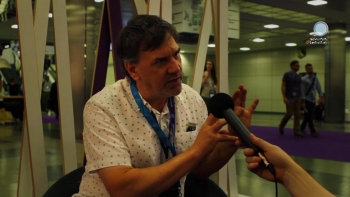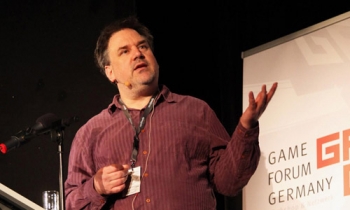Part 2 of our Interview with Ron Gilbert.

Back to Part 1
In your Blog "Grumpygamer" you wrote about how hard it has become to pitch creative ideas to publishers these days. What do you think are the main difficulties or obstacles that young or new developers have to face?
Ron Gilbert: I think pitching any new and creative idea to a publisher is extremely difficult, if not virtually impossible. So if you are really trying to pitch something to the traditional publishers, it is going to be very, very hard to do, because they are so risk-averse. They have to have something they think is going to be a success, and there is a whole process involved in such an evaluation. The marketing department is going to take a look at it and evaluate it and the sales department is going to run a bunch of numbers and so on before they come to a conclusive decision. So if you have anything new or different, they have no way of doing that, they have no way to evaluate or crunch the numbers, so they are scared and they will refuse to sign it. The most interesting right now is the app- market for android and iPhones though. I find that an absolutely fascinating world, because you two people can make a game from scratch and it can be sold through the app store or marketplace and sell millions of copies. There are many games out there that were made by one or two people and sold a million copies. And nobody has to tell you "Yes, it’s okay to make that game", like Microsoft for the Xbox or Sony for the PlayStation and smartphones really open that up to all developers. I spend a lot of time playing iPhone games and they are a lot of fun. And that is really a new way for developers to make games and get them out there for people to actually play.
Is there a piece of advice you could give someone trying to make it as an adventure game developer today?
Ron Gilbert: I think the advice I would give them is to really think about the iPhone and android phones. People become really attached to their phones. It is almost like the one thing they do not use their phones for is to make calls. Gaming is very popular, which surprised Apple a lot. I do not think they expected that, of all the apps you could buy at the Apple store, games would be this successful. For a lot of people their phones have become the ultimate gadget, they have their calendars on it, their emails, twitter is on it and their games are on it. And I think young developers should seriously consider it. It is a device that is with you all the time, on the bus, at the doctor’s office and people like to game. And they should really think about making games for that because they would meet a very good audience for that.
And do you think there will possibly develop an all new audience for adventure games as well?
Ron Gilbert: Yeah, I think it could. 'Monkey Island' did really, really well when we released that on the iPhone and the iPad. Developing games for those platforms challenges game designer because I think that you have to re-think and re-learn a lot. Because when people play a game on the phone, they tend to do it in spurts, not for extended periods of time. I would actually try to design the adventure game around that mindset. So that instead of doing something in five hours at a time, you could do it in little spurts. That could be a really good formula for adventure games on smartphones and really work for that audience.
Death Spank was your first ‘core’ game in a long time. How was it and how did it feel to get back to doing that?
Ron Gilbert: It was a lot of fun. I really missed doing that. I spent a lot of years after LucasArts making adventure games for kids, which was a lot of fun. I learned a lot about game design in that time. I really enjoyed games like 'Freddy Fish' or 'Pajama Sam', and it was definitely a great experience. But going back to making the kind of games that I would enjoy myself was really something I missed a lot.
After leaving LucasArts, did you consciously decide not to make ‘core’ adventure games anymore or was making adventures for kids something that you wanted to try out?
Ron Gilbert: No, when I left LucasArts and started Humongous Entertainment we were going to make regular adventure games, at least that was the plan, but we did not have a lot of money. Back then Broderbund had those ‘living books’ and I remember looking at them and seeing how bad they were. They were trying to be a game, but they were not more than a book and you could click on things. I was watching a five-year-old play 'Monkey Island', and could not read, so he did not know what was going on, but had a ton of fun just opening doors and picking up stuff and clicking around. And so I thought: "Hey! Kids could really like this". So we did not have a lot of money and had to make it very much smaller than we had first planned. But they became very successful. Clearly there is a huge market for kids’ adventures games, so we just never got around to making the regular adventure games again.
Interesting, you said in an interview that you always had to think of a reason why a character would pick something up and not just steal it.
Ron Gilbert: Yeah, that was a big issue, because we did not want kids to learn this kind of thing, because adventure games are really about kleptomania. So there always had to be reasons that had to make some kind of sense to the kids. So an item would just sit around and the kids would try and pick it up, so their character would ask: "Can I borrow this?" and the other character would agree or ask for a favor in return. But that was something that we had to work around a lot.
In an interview with kotaku you said about your upcoming super-secret game that 'Fans of those old adventure games will like it'. How did you mean that and could you elaborate on that?
Ron Gilbert: (laughs) I knew it. I knew I shouldn’t have said that.
Yes, but how did you mean it?
Ron Gilbert: (laughs, then thinks) That I really hope that classic adventure gamers are going to enjoy the game that I am currently working on. I admit as much: It is not a first-person-shooter.
Would it still challenge you to make a 'classic', old school point&click adventure game?
Ron Gilbert: Yes, but I do not think a lot of people outside the classic adventure fans, or even the 'Monkey Island' fans, would want to play it and I am not sure it would be enough to make it work, time- and moneywise. But I would love to do it. I think there would be some challenge in doing that, but also figuring out what innovation we could bring to the product that is maybe going to attract more people than the classic 'Monkey Island' crowd.
We heard it’s basically mandatory to ask you a certain question.
Ron Gilbert: (laughs)
So here we go: What is the secret of Monkey Island?
Ron Gilbert: (laughs) Someday I’m going to have to write a blog entry and tell everybody about what it is. But there really is a secret. And LeCuck being Guybrush’s brother is not it. Actually, when I started making 'Monkey Island' I did have this whole weird plan about the entire storyline and there really was a secret.
And did you plan to explore that more?
Ron Gilbert: Yeah, in the third game I would have tried to wrap that up. The third game would have revealed that secret. I think Tim (Schafer) and Dave (Grossman) knew about it, but I did not really tell anyone else about it yet, so when they [the team on MI3] made 'The Curse of Monkey Island', they did not know where to go. But they really did the best they could with that.
Monkey Island is still kind of a big deal; do you remember how it was back then to release a game?
Ron Gilbert: Not really, and the reason I do not is we worked really different back then. Because back then we would work on a game and we’d finish it and then it would spend two weeks in the QA period where we would test it and then we would send the gold master discs off to the pressing plant. Then there was this long gap of two months and not only does it reach the shelves later, but there was no internet so it took two months for the magazines to test and review it. So when Monkey Island actually came out we were already on our way into the development of Monkey Island 2. So that immediate satisfaction you get today from releasing a game and going to all the websites to read about it simply did not exist back then. So it wasn’t such a memorable event per se because of that.
True, today you’re finishing the game and like ten days later you can read all about it and see all the people’s reactions to your game. That’s a completely different process.
Ron Gilbert: Absolutely.
So thank you again for answering our admittedly very difficult questions. We wish you all the best and good luck with your upcoming projects.
Ron Gilbert: Thank you and thanks to your readers!
In your Blog "Grumpygamer" you wrote about how hard it has become to pitch creative ideas to publishers these days. What do you think are the main difficulties or obstacles that young or new developers have to face?
Ron Gilbert: I think pitching any new and creative idea to a publisher is extremely difficult, if not virtually impossible. So if you are really trying to pitch something to the traditional publishers, it is going to be very, very hard to do, because they are so risk-averse. They have to have something they think is going to be a success, and there is a whole process involved in such an evaluation. The marketing department is going to take a look at it and evaluate it and the sales department is going to run a bunch of numbers and so on before they come to a conclusive decision. So if you have anything new or different, they have no way of doing that, they have no way to evaluate or crunch the numbers, so they are scared and they will refuse to sign it. The most interesting right now is the app- market for android and iPhones though. I find that an absolutely fascinating world, because you two people can make a game from scratch and it can be sold through the app store or marketplace and sell millions of copies. There are many games out there that were made by one or two people and sold a million copies. And nobody has to tell you "Yes, it’s okay to make that game", like Microsoft for the Xbox or Sony for the PlayStation and smartphones really open that up to all developers. I spend a lot of time playing iPhone games and they are a lot of fun. And that is really a new way for developers to make games and get them out there for people to actually play.
Is there a piece of advice you could give someone trying to make it as an adventure game developer today?
Ron Gilbert: I think the advice I would give them is to really think about the iPhone and android phones. People become really attached to their phones. It is almost like the one thing they do not use their phones for is to make calls. Gaming is very popular, which surprised Apple a lot. I do not think they expected that, of all the apps you could buy at the Apple store, games would be this successful. For a lot of people their phones have become the ultimate gadget, they have their calendars on it, their emails, twitter is on it and their games are on it. And I think young developers should seriously consider it. It is a device that is with you all the time, on the bus, at the doctor’s office and people like to game. And they should really think about making games for that because they would meet a very good audience for that.
And do you think there will possibly develop an all new audience for adventure games as well?
Ron Gilbert: Yeah, I think it could. 'Monkey Island' did really, really well when we released that on the iPhone and the iPad. Developing games for those platforms challenges game designer because I think that you have to re-think and re-learn a lot. Because when people play a game on the phone, they tend to do it in spurts, not for extended periods of time. I would actually try to design the adventure game around that mindset. So that instead of doing something in five hours at a time, you could do it in little spurts. That could be a really good formula for adventure games on smartphones and really work for that audience.
Death Spank was your first ‘core’ game in a long time. How was it and how did it feel to get back to doing that?
Ron Gilbert: It was a lot of fun. I really missed doing that. I spent a lot of years after LucasArts making adventure games for kids, which was a lot of fun. I learned a lot about game design in that time. I really enjoyed games like 'Freddy Fish' or 'Pajama Sam', and it was definitely a great experience. But going back to making the kind of games that I would enjoy myself was really something I missed a lot.
After leaving LucasArts, did you consciously decide not to make ‘core’ adventure games anymore or was making adventures for kids something that you wanted to try out?
Ron Gilbert: No, when I left LucasArts and started Humongous Entertainment we were going to make regular adventure games, at least that was the plan, but we did not have a lot of money. Back then Broderbund had those ‘living books’ and I remember looking at them and seeing how bad they were. They were trying to be a game, but they were not more than a book and you could click on things. I was watching a five-year-old play 'Monkey Island', and could not read, so he did not know what was going on, but had a ton of fun just opening doors and picking up stuff and clicking around. And so I thought: "Hey! Kids could really like this". So we did not have a lot of money and had to make it very much smaller than we had first planned. But they became very successful. Clearly there is a huge market for kids’ adventures games, so we just never got around to making the regular adventure games again.
Interesting, you said in an interview that you always had to think of a reason why a character would pick something up and not just steal it.
Ron Gilbert: Yeah, that was a big issue, because we did not want kids to learn this kind of thing, because adventure games are really about kleptomania. So there always had to be reasons that had to make some kind of sense to the kids. So an item would just sit around and the kids would try and pick it up, so their character would ask: "Can I borrow this?" and the other character would agree or ask for a favor in return. But that was something that we had to work around a lot.
In an interview with kotaku you said about your upcoming super-secret game that 'Fans of those old adventure games will like it'. How did you mean that and could you elaborate on that?
Ron Gilbert: (laughs) I knew it. I knew I shouldn’t have said that.
Yes, but how did you mean it?
Ron Gilbert: (laughs, then thinks) That I really hope that classic adventure gamers are going to enjoy the game that I am currently working on. I admit as much: It is not a first-person-shooter.
Would it still challenge you to make a 'classic', old school point&click adventure game?
Ron Gilbert: Yes, but I do not think a lot of people outside the classic adventure fans, or even the 'Monkey Island' fans, would want to play it and I am not sure it would be enough to make it work, time- and moneywise. But I would love to do it. I think there would be some challenge in doing that, but also figuring out what innovation we could bring to the product that is maybe going to attract more people than the classic 'Monkey Island' crowd.
We heard it’s basically mandatory to ask you a certain question.
Ron Gilbert: (laughs)
So here we go: What is the secret of Monkey Island?
Ron Gilbert: (laughs) Someday I’m going to have to write a blog entry and tell everybody about what it is. But there really is a secret. And LeCuck being Guybrush’s brother is not it. Actually, when I started making 'Monkey Island' I did have this whole weird plan about the entire storyline and there really was a secret.
And did you plan to explore that more?
Ron Gilbert: Yeah, in the third game I would have tried to wrap that up. The third game would have revealed that secret. I think Tim (Schafer) and Dave (Grossman) knew about it, but I did not really tell anyone else about it yet, so when they [the team on MI3] made 'The Curse of Monkey Island', they did not know where to go. But they really did the best they could with that.
Monkey Island is still kind of a big deal; do you remember how it was back then to release a game?
Ron Gilbert: Not really, and the reason I do not is we worked really different back then. Because back then we would work on a game and we’d finish it and then it would spend two weeks in the QA period where we would test it and then we would send the gold master discs off to the pressing plant. Then there was this long gap of two months and not only does it reach the shelves later, but there was no internet so it took two months for the magazines to test and review it. So when Monkey Island actually came out we were already on our way into the development of Monkey Island 2. So that immediate satisfaction you get today from releasing a game and going to all the websites to read about it simply did not exist back then. So it wasn’t such a memorable event per se because of that.
True, today you’re finishing the game and like ten days later you can read all about it and see all the people’s reactions to your game. That’s a completely different process.
Ron Gilbert: Absolutely.
So thank you again for answering our admittedly very difficult questions. We wish you all the best and good luck with your upcoming projects.
Ron Gilbert: Thank you and thanks to your readers!






